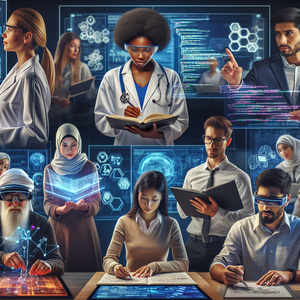The Future of Work: How to Prepare for Careers That Don't Exist Yet

Understanding the technological forces at play is crucial for those looking to future-proof their careers. Industries across the board are being reshaped by emerging technologies. For instance, the healthcare sector is witnessing the rise of roles like telehealth coordinators and health data analysts as telemedicine and analytics become integral to patient care. Similarly, the growth of renewable energy technologies is fostering new careers in solar energy installation and energy management. Experts like Klaus Schwab, founder of the World Economic Forum, argue that “the Fourth Industrial Revolution” will not only alter existing jobs but also generate entirely new categories of employment. The emergence of roles such as AI trainers, virtual reality experience designers, and blockchain specialists highlights the need for professionals to stay informed about technological trends and their implications.
The Importance of Lifelong Learning
In a world where the only constant is change, a commitment to lifelong learning is paramount. The traditional model of education, where one obtains a degree and expects to secure employment for life, is becoming obsolete. Instead, individuals must embrace continuous education through various pathways, including online courses, workshops, and certifications. Platforms such as Coursera, Udacity, and edX offer courses that can help individuals upskill in emerging areas like data science, digital marketing, and AI ethics. For example, a marketing professional may take a course on data analytics to better understand consumer behavior in a digital landscape. This proactive approach not only enhances job security but also positions individuals to pivot into new roles as industries evolve.
Cultivating Soft Skills
As technology continues to automate routine tasks, soft skills—such as emotional intelligence, creativity, and critical thinking—are becoming increasingly valuable. Experts, including Daniel Pink, author of "A Whole New Mind," assert that the future workforce will need a combination of technical expertise and interpersonal skills to thrive. Individuals can cultivate these soft skills through various means. Participating in team projects, engaging in public speaking, or taking on leadership roles in community organizations can enhance one’s ability to communicate, collaborate, and innovate. These experiences not only build essential soft skills but also foster a network of connections that can be instrumental in career advancement.
Networking in the Age of Digital Connectivity
Networking remains a crucial element of career development, but its execution has transformed with the advent of digital connectivity. Social media platforms like LinkedIn have revolutionized how professionals build relationships. According to LinkedIn, 70% of people were hired at a company where they had a connection, highlighting the importance of effective networking. Individuals should actively engage with industry groups, participate in webinars, and share their insights on social media to expand their reach and visibility. Moreover, attending industry conferences—whether virtual or in-person—provides invaluable opportunities to interact with potential employers and thought leaders, paving the way for future career prospects.
As we navigate the evolving job landscape, preparing for careers that do not yet exist requires a multifaceted approach. By staying informed about emerging technologies, committing to lifelong learning, cultivating soft skills, and engaging in effective networking, individuals can position themselves for success in an uncertain future. While the road ahead may be fraught with challenges, those who embrace change and actively invest in their personal and professional development will be well-equipped to seize the opportunities that arise. The future of work is not something to fear; rather, it is a canvas upon which we can paint our careers anew.
AI Trainer
Tech companies like Google, Amazon, and startups focusing on AI solutions.
Core Responsibilities
Develop and refine machine learning models by providing real-world data and feedback to enhance AI learning processes.
Collaborate with data scientists to ensure AI systems align with user needs and ethical guidelines.
Design training sessions for AI systems, including natural language processing and image recognition tasks.
Required Skills
Strong understanding of machine learning algorithms and data annotation tools.
Proficiency in programming languages such as Python or R.
Experience in user experience design and human-computer interaction.
Telehealth Coordinator
Hospitals, healthcare clinics, and telehealth service providers like Teladoc and MDLIVE.
Core Responsibilities
Manage the logistics of virtual healthcare appointments, ensuring smooth operations between patients and healthcare providers.
Educate patients on using telehealth platforms and troubleshoot technical issues.
Analyze patient data to identify trends and improve telehealth services.
Required Skills
Familiarity with telemedicine technologies and healthcare regulations.
Excellent communication skills and a customer-centric approach.
Ability to work with electronic health records (EHR) systems.
Virtual Reality Experience Designer
Gaming companies, educational institutions, and entertainment firms.
Core Responsibilities
Create immersive environments and experiences for applications in gaming, education, and training.
Collaborate with developers and artists to integrate interactive elements into VR projects.
Conduct user testing and gather feedback to enhance user experience.
Required Skills
Proficiency in 3D modeling software (e.g., Blender, Unity, or Unreal Engine).
Strong understanding of user interface (UI) and user experience (UX) design principles.
Creativity and storytelling abilities to craft engaging experiences.
Renewable Energy Analyst
Energy companies, environmental organizations, and government agencies focused on sustainability.
Core Responsibilities
Conduct research and data analysis to evaluate the feasibility and impact of renewable energy projects.
Monitor market trends and regulatory policies affecting the renewable energy sector.
Collaborate with engineering teams to optimize energy production from renewable sources.
Required Skills
Strong analytical skills with proficiency in data analysis tools and software (e.g., Excel, MATLAB).
Knowledge of energy policies and renewable technologies (solar, wind, etc.).
Excellent communication skills to present findings to stakeholders.
Blockchain Specialist
Fintech companies, startups in the blockchain space, and large corporations exploring blockchain solutions.
Core Responsibilities
Design and implement blockchain solutions for various applications, including finance, supply chain, and healthcare.
Conduct security audits and ensure the integrity and efficiency of blockchain networks.
Collaborate with cross-functional teams to integrate blockchain technology into existing systems.
Required Skills
In-depth knowledge of blockchain protocols (e.g., Ethereum, Hyperledger).
Proficiency in programming languages relevant to blockchain development (e.g., Solidity, JavaScript).
Understanding of cryptography and security best practices.


